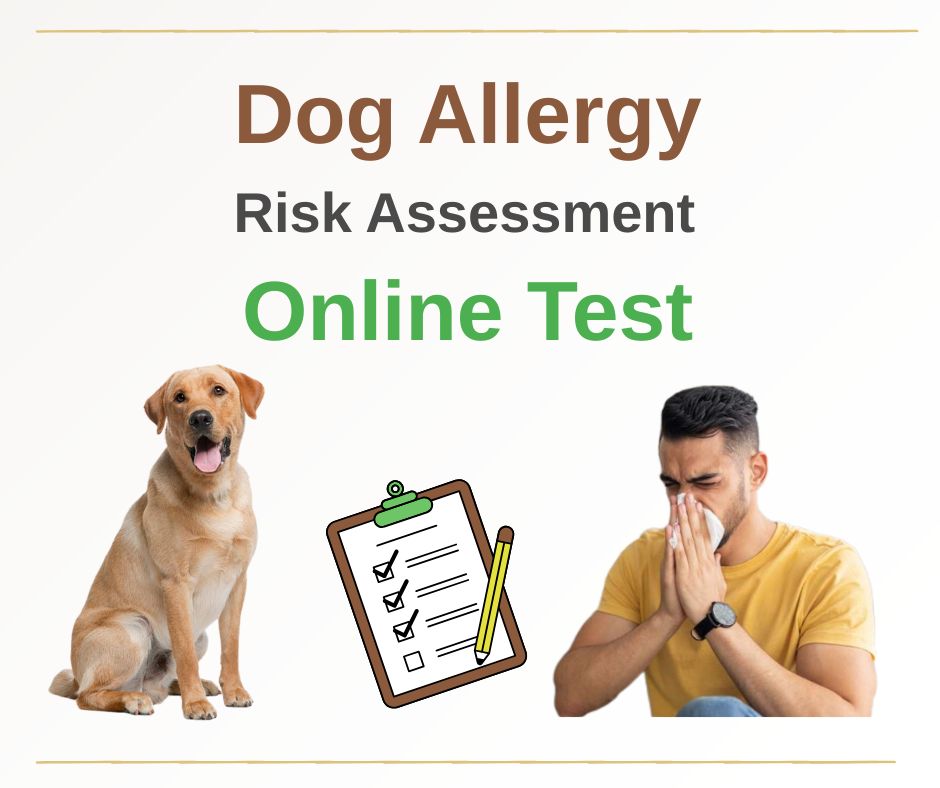🧪 Dog Allergy Risk Assessment TestDiscover your potential risk of dog allergies in just 2 minutes 
🔬 Free Online Dog Allergy AssessmentAre you considering getting a dog but worried about allergies? This science-based assessment helps you understand your potential risk of developing allergic reactions to dogs. Answer 10 quick questions to get your personalized risk profile and recommendations. No email required • Instant results • Completely free ⚠️ Important InformationThis test can:
This test cannot:
For accurate diagnosis, please consult an allergist. Question 1 of 10 🔬 Professional Dog Allergy TestingWhile this online assessment provides valuable insights into your risk factors, only medical professionals can definitively diagnose dog allergies. Here's what you need to know about professional allergy testing: Types of Allergy Tests💉 Skin Prick Test (SPT)The most common and reliable method for diagnosing dog allergies. A small amount of dog allergen is pricked into your skin, and the reaction is observed after 15-20 minutes. 💰 Cost: $60-$300
Pros: Quick results, highly accurate, can test multiple allergens at once Cons: Minor discomfort, must avoid antihistamines before testing 🩸 Blood Test (IgE Test)Measures the level of specific IgE antibodies to dog allergens in your blood. Common tests include RAST (radioallergosorbent test) or ImmunoCAP. 💰 Cost: $200-$1,000
Pros: No need to stop medications, can be done if you have skin conditions, useful for people who can't do skin tests Cons: More expensive, takes several days for results, slightly less sensitive than skin tests 🏠 At-Home Test KitsCompanies like EverlyWell and MyAllergyTest offer at-home testing kits where you collect a sample (hair, saliva, or blood) and mail it to a lab for analysis. 💰 Cost: $99-$300
Pros: Convenient, privacy, can test for dog-specific allergens and food sensitivities Cons: May be less accurate than clinical tests, not always accepted by insurance, results should be confirmed by a doctor 🧬 Component-Resolved Diagnostics (CRD)Advanced testing that identifies which specific dog allergen proteins (Can f 1, Can f 2, Can f 5, etc.) you're sensitive to, providing more detailed information. 💰 Cost: $300-$600
Pros: Most detailed analysis, helps predict severity, useful for immunotherapy planning Cons: Expensive, not always necessary, requires specialist interpretation 💡 Important Considerations:
🏥 When to See an Allergist:Consider professional testing if you:
💰 Money-Saving Tip:Ask your primary care physician for a referral to an allergist. Many insurance plans require referrals, and going through proper channels ensures better coverage. Some allergists also offer payment plans for uninsured patients. ❓ Frequently Asked QuestionsHow accurate is this online dog allergy test?This assessment is designed as a preliminary screening tool based on known risk factors and symptoms associated with dog allergies. While it can provide valuable insights into your potential risk level, it's not a diagnostic tool. For accurate diagnosis, you should consult with an allergist who can perform proper allergy testing such as skin prick tests or blood tests. Can I develop dog allergies even if I've never had them before?Yes, it's possible to develop dog allergies at any age, even if you've been around dogs your entire life without problems. Allergies can develop when your immune system becomes sensitized to dog allergens over time. However, some people may also experience a decrease in symptoms with prolonged exposure, a phenomenon known as tolerance development. Are there truly hypoallergenic dog breeds?No dog breed is 100% hypoallergenic, as all dogs produce allergens. However, some breeds are considered more suitable for people with allergies because they shed less dander, produce less saliva, or have coat types that trap allergens better. Breeds like Poodles, Bichon Frises, and Portuguese Water Dogs are often recommended for allergy sufferers, but individual reactions can vary significantly. What should I do if my test shows high allergy risk?If your results indicate high risk, we strongly recommend consulting with an allergist before getting a dog. They can perform proper allergy testing and discuss management options such as immunotherapy (allergy shots), medications, or environmental controls. If you're determined to have a dog, spending time with the specific breed you're considering and implementing strict allergen-reduction measures in your home can help. How long does it take for dog allergy symptoms to appear?Dog allergy symptoms can appear within minutes of exposure or may take several hours to develop. Some people experience immediate reactions when entering a home with dogs, while others may not notice symptoms until after prolonged exposure. The timing and severity of symptoms depend on your sensitivity level, the amount of allergen exposure, and environmental factors. Can dog allergies be cured?While there's no definitive "cure" for dog allergies, they can be effectively managed. Immunotherapy (allergy shots or sublingual tablets) can significantly reduce symptoms over time and may lead to long-term tolerance in some people. Other management strategies include avoiding exposure, using air purifiers, regular cleaning, keeping dogs out of bedrooms, and taking antihistamines or other allergy medications as prescribed by your doctor. 🐕 Already Know You Can Have a Dog?If you've determined that dog allergies won't be a barrier, or you're looking for breeds that are better suited for allergy sufferers, our interactive breed selector can help you find your perfect match! Discover breeds that match your lifestyle, living situation, and allergy needs! | |
|
| |
| Переглядів: 108 | | |
| Total comments: 0 | |

